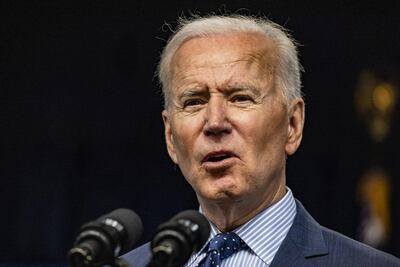A deal on taxing tech giants at this week's G7 finance meeting would only be the start of a lengthy process, an expert has said.
The US is pushing for a global minimum tax rate which would stop companies from gaming the system and boost government revenues after the pandemic.
G7 finance ministers are expected to discuss the proposal in talks on Friday and Saturday in the run-up to next week’s leaders’ summit in Britain.
Patrick Holden, an expert in international political economy at the University of Plymouth, said a deal would be the first major piece of tax co-operation in the modern era.
But Dr Holden told The National there would still be significant hurdles between a G7 deal and implementing the proposal.
“I think they’ll come up with some minimum agreement and then they’ll have to get the countries at the G20 which is happening later this summer in Italy to agree, and that includes China, Russia and Brazil and lots of other big countries like that,” he said.
“An entity like the G7, it’s like a club, it’s not like the EU or even the United Nations or the World Trade Organisation where they make laws.
“They would all have to put it into legislation in Japan and Canada and the US and UK and so on, so that’s going to be a long process with lots of nuances involved.”
He said: “It will be an important agreement, and it will send a signal in various senses, but there’ll be a lot for lawyers and accountants to work out.”
Germany and the US, which back the minimum tax proposal, both voiced optimism over the prospects for a G7 agreement.
German Finance Minister Olaf Scholz said G7 nations were “very close to concluding an international agreement”.

Tax deal could net billions in revenue
Washington wants a minimum of at least 15 per cent, but there are calls for a higher floor, such as 21 or 25 per cent.
Research unveiled by the European Tax Observatory found that the revenues of EU countries could rise by more than $200 billion a year at the higher rate.
In this scenario, EU countries would force companies to make up the difference at home if they pay a lower rate in overseas tax havens.
This would make it impossible for companies to lower their bills by setting up shop in low-tax countries such as Ireland.
Ireland's corporate tax rate of 12.5 per cent is one of the lowest in the world, attracting a clutch of tech companies, such as Google and Facebook.
Ireland, which is not in the G7, said it had “significant reservations” about the US tax proposal.
French European affairs minister Clement Beaune said Ireland was the EU member most hostile to the idea, with Cyprus and Malta also sceptical.
Alex Cobham, the chief executive of the Tax Justice Network, said at a World Economic Forum event that the extra revenues from a minimum tax could help recovery from the pandemic.
“Fifteen per cent would be a step forward, it would still bring in more than $250 billion of new revenues and that would make it the biggest change in 100 years in international tax rules,” he said.
“If they go to 21 per cent, or even better to 25 per cent, we're talking $500bn, $600bn or $700bn, that sort of money.
“When you're thinking about perhaps $50 billion needed for Covax or the amounts to invest in public health systems in lower income countries, suddenly, this is really game changing.”
Dr Holden said the pandemic had given a burst of momentum to the idea.
“The pandemic has done a lot of damage to the finances of countries including major countries like the G7 ones,” he said.
“There’s been a series of crises, but obviously the pandemic has been the point of the spear.”



